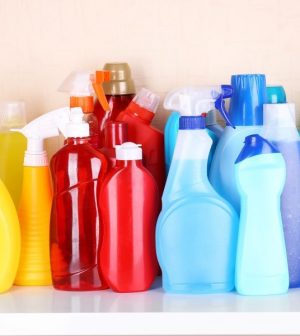- Recognizing the Signs of Hypothyroidism
- 10 Strategies to Overcome Insomnia
- Could Artificial Sweeteners Be Aging the Brain Faster?
- Techniques for Soothing Your Nervous System
- Does the Water in Your House Smell Funny? Here’s Why
- Can a Daily Dose of Apple Cider Vinegar Actually Aid Weight Loss?
- 6 Health Beverages That Can Actually Spike Your Blood Sugar
- Treatment Options for Social Anxiety Disorder
- Understanding the Connection Between Anxiety and Depression
- How Daily Prunes Can Influence Cholesterol and Inflammation
Pandemic Has People Cleaning, and That Means More Asthma Attacks

The coronavirus pandemic has turned many people into clean freaks, but new research suggests that deploying all those extra household disinfectants might be triggering asthma flare-ups.
“We became concerned with increased cleaning and disinfecting related to the COVID-19 pandemic, combined with people spending more time indoors may expose people with asthma to more environmental triggers for asthma symptoms,” said study co-leader Kamal Eldeirawi. He’s an associate professor in the University of Illinois, Chicago, College of Nursing.
“This prompted our interest in studying the impact of disinfectants and asthma control among those living with asthma,” Eldeirawi said in a university news release.
For the study, the researchers conducted an online survey of 795 adults with asthma between May and September 2020. It found a large increase in respondents who said they used household disinfectants five or more times a week: 138% for disinfectant wipes, 121% for disinfectant sprays, 155% for bleach and water solution, and 89% for other cleaning liquids.
The researchers also noted significant associations between uncontrolled asthma and frequent disinfectant use during the pandemic.
The investigators didn’t analyze data on possible asthma-related increases in visits to health care providers or emergency departments, but a large percentage of the respondents said they’d had an asthma attack, according to Eldeirawi.
The findings were published recently in the Journal of Allergy and Clinical Immunology: In Practice.
The study authors suggested that increased use of household disinfectants could be affecting people with asthma, and they should talk to their health care providers about safer cleaning alternatives.
Cleaning product alternatives include vinegar, water and a drop of dish detergent, 70% alcohol, or hydrogen peroxide.
The full extent of the COVID-19 pandemic’s impact on people with asthma remains unknown, but research on the issue is being conducted worldwide, Eldeirawi said.
The research team said that they will continue their research, including asking survey respondents about their symptoms and mask use.
More information
Asthma Canada has more on asthma and COVID-19.
SOURCE: University of Illinois at Chicago, news release, Feb. 10, 2021
Source: HealthDay
Copyright © 2026 HealthDay. All rights reserved.










